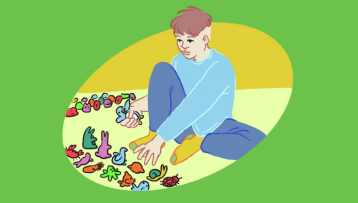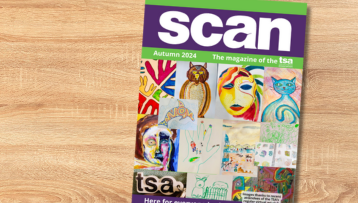Many children and children-at-heart love the opportunity to embrace Halloween, especially when it involves dressing up, new experiences and fun activities. However, some children and adults, especially many with TSC, might find this time quite overwhelming.
With about half of people with TSC being neurodivergent, it’s essential to recognise and appreciate the unique challenges that Halloween can present. Yet, with some simple steps it’s possible to ensure that everyone can enjoy the spooky season.
Why Halloween and other occasions can be a challenge
Halloween can introduce a host of unpredictabilities that might be stressful for those who like routine and clear steps to their days. Things like confusing costumes, unexpected people at the door and general uncertainty can be daunting things to face. Some people can also struggle with the sensory experience of Halloween, with bright costume, loud noises and different food being a challenge.
All of these things can result in a situation that is overwhelming or difficult to handle. You might be tempted to ‘cancel’ Halloween altogether, although it could be that doing a few basic changes makes the occasion understandable for everyone.
Incorporating Halloween into familiar routines
Celebrating Halloween doesn’t mean changing everything. You could make some small shifts that still give you and the family a nice ‘Halloween nod’ that’s a little bit more comfortable.
Do you have a regular movie night at home? Maybe you can make it Halloween themed? Rather than getting a full outfit, perhaps a more basic costume would be easier – even Halloween-inspired pyjamas or a t-shirt with a Halloween motif? Anyone who struggles with the idea of dressing up could even be encouraged to enjoy dressing up a toy or simply drawing what they’d look like in fancy dress instead.
If you’re going to give Halloween activities a go, such as apple bobbing or Halloween decorations, talk through with the family what these things specifically are and what they might expect. You could perhaps introduce things slowly, or tailor the activities to suit the needs of your loved ones – if bright colours and lights are a challenge, maybe something softer?
It could be that your loved one absolutely loves Halloween, to the point they they don’t want it to end! Being clear with them about when Halloween will finish can help with this, or pack things away like decorations more slowly than usual so that slowly return back to ‘normal times’.
Preparing for Trick-or-Treaters
A knock at your own door, or venturing out yourselves, can be stressful for those who don’t follow what’s happened or expected.
- Plan ahead as much as possible: Be specific with loved ones about where you’ll go, how long you’ll be out, and what to expect. You could even right down a check-list, or do a ‘practice knock’ on your own door, with a loved one answering the door
- Use visual aids: Social stories or visual schedules can help explain the sequence of events and set expectations
- Practice scripts: Roleplay the expected interactions, such as saying “trick or treat” or “thank you,” to build understanding and confidence of what’s to come
- Set clear boundaries and a way to leave: Discuss things that anyone in the family can do if they’d like to leave, such as a visual clue. Perhaps patting themselves on the head or clearly saying “I’d like to go home now”.
- Prepare for the unexpected: Talk through ‘What if’ scenarios, like encountering a scary costume or not receiving a treat at a house. If a costume is particularly scary, encourage your child to tell you so you can perhaps go a different route or help shield them from it
- Agree on safety: Agree to stick together, be very visible to each other, and to look out for each other
Remember their limits
Everyone reaches their social limit at some point, and many people with TSC reach this earlier than others. Be clear with your loved one that they are free to do this at any time
You know your family best
Most importantly of all, you and your family know each other best. If Halloween is simply not for them, that’s absolutely fine and they should be told this. The best times are those that are stress-free and enjoyable for all. If the spooky season is simply too much, then a completely different activity is ok – this in itself could even become your tradition and bring joy!








































































































































